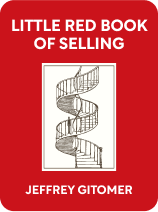

This article is an excerpt from the Shortform book guide to "Little Red Book of Selling" by Jeffrey Gitomer. Shortform has the world's best summaries and analyses of books you should be reading.
Like this article? Sign up for a free trial here .
What’s the secret to sales success? How do some salespeople manage to consistently close sale after sale, cashing in commissions, while others struggle to hit their minimum?
Salespeople are always looking for the “secret” to selling. Companies spend countless dollars and hours training their sales teams on how to sell. But before you can sell, you need to understand why people buy.
In this article, we’ll discuss the top reasons why people buy and how you can use this knowledge to sell better.
What Makes People Buy?
Few companies know or ask their customers why they buy. You may think you already understand why people buy, but you don’t if you’re experiencing any of the following in your sales process:
- Customers object to your price.
- They request that you provide a bid or proposal.
- They won’t return your calls.
- They say they’re satisfied with their current vendor.
- You think sales are slow because the economy’s slow.
All of these experiences indicate you haven’t created an atmosphere conducive to buying by focusing on the reasons people buy. For example, if you’re wrangling over price, you’ve failed to convince the customer of your product’s value and fit for her, which are among the reasons people buy.
Here are the top reasons why people buy:
- They like the salesperson. Further, they trust, believe in, have confidence in, and feel comfortable with the sales rep. (The sales cycle starts with the customer liking and trusting the salesperson, proceeds to buying, and continues with an ongoing relationship.)
- They view the salesperson and company as different from competitors.
- They see the salesperson as a resource and as someone who’s trying to help them.
- They see value in the product or service they’re buying; they believe it will increase their productivity and profit.
- The product or service fits their needs.
- They view the price as fair for the value they’re getting, although it may not be the lowest available.
To find out specifically why your customers buy from you, ask them. The sales principles in this article will help you build on customers’ existing buying reasons to create an atmosphere conducive to buying—for example, by building a strong relationship and addressing their needs for profit and productivity.
Set the Stage for Success
Before delving into the sales principles, set yourself up for success by adopting the following mindset and behaviors:
- Believe in yourself and your product. This requires a daily commitment to positive self-talk. Nobody will want to buy your product if you project a lack of confidence in it.
- Associate with positive, successful people whose good habits and success will inspire you, rather than negative people who will drag you down.
- Learn continuously so you excel in your work.
- Become a valuable resource to the people around you. For example, share tips or help people network. Be known first for what you contribute rather than what you sell. First, it makes you a good person, and second, people will be more receptive to your selling efforts if you’ve previously helped them somehow.
- Have a positive attitude—this enables you to see opportunities, especially in adversity. Seize these opportunities.
- Be willing to take risks and make mistakes, but especially to act. Don’t fear failure: When something goes wrong, look for the “why,” the solution, the opportunity, and the lesson.
- Take responsibility for what you do and for whatever happens to you. The less time you spend blaming others, the more you’ll succeed.
- Stay focused on your goals and persist until you win. Ignore naysayers.
If there’s a “secret” to selling, it’s that you are your own biggest secret—and biggest hurdle—to success.
The Sales Principles
Below we will examine 13 principles of successful selling, which address habits that aid selling success, preparation for selling, and how to sell effectively. Each principle will be explored in detail in subsequent chapters.
Practice Success Habits
- Motivate yourself: Selling is challenging—you get rejected, deals fall through, you get into slumps. Instead of whining, work harder. You have a duty to yourself to succeed. Kick yourself to be sure that you do.
- Mind your own business: A key to making the other selling principles in this list work is focusing on your work and staying out of other people’s business. Don’t devote energy to the problems and dramas of colleagues, customers, bosses, vendors, and friends, at the expense of your own career and success.
- Be alert to opportunities: Pay attention to your surroundings and the people around you. You can make useful connections and get sales leads anywhere, including airports, at a child’s school event, or while waiting in lines.
Prepare for Success
- Develop your brand: Success often depends more on who knows you than on who you know. Having a strong brand means making potential customers aware of you through public speaking, community leadership, social media outreach, and so on. They’ll call you (rather than you calling them), and you’ll get more yeses.
- Network: Networking, or regularly meeting people face-to-face through various events and interactions, is essential for salespeople and entrepreneurs. It leads to more referrals, prospects, and sales; builds relationships; and advances your career and reputation. It’s the best way to get an initial face-to-face sales meeting with a prospect (prospects are more likely to agree to a meeting with someone they know from networking).
- Learn to use humor: People are always looking for a laugh. If you can make a person laugh, you’ll create a bond that makes her more likely to buy—so learn to use humor in your sales process, whether you’re naturally funny or not, by studying and practicing it. Effective humor is personal (poke fun at yourself), clean, tested, and brief.
- Develop creativity to stand out: Creativity is essential to sales success because it’s differentiating: It sets you apart from the competition (most salespeople say and do the same things). Like humor, you can study and learn creativity. Ways to employ creativity in sales include asking questions that make you stand out and having a unique voicemail greeting and business cards.
Sell Effectively: Get the Customer’s Attention
- Prepare to sell: Don’t complain and make excuses that selling is hard—work hard instead. Start your workday the night before by doing your homework on prospective clients and their business. If you don’t, you’ll lose sales to others who do prepare.
- Meet with the top decision-maker: To sell, you need a face-to-face appointment with the top decision-maker, not an underling who must get someone else’s approval before buying. Networking and branding can help you get past gatekeepers—however, you also need to give the decision-maker a compelling reason to meet with you: Address her specific interests and concerns.
- Give value: Constantly give value to others in your life by being a resource people come to for useful information. In customer relationships, emphasize your product’s value—how it improves buyer productivity and profits.
Sell Effectively: Clinch the Deal
- Help the buyer convince himself to buy: Help the buyer think about your product or service in terms of how it solves his problems or achieves his goals. Ask specific questions that uncover his frustrations, concerns, and needs. Then show how your product can make his life easier, and he’ll conclude that he needs it.
- Eliminate the buyer’s risk: A risk is anything that makes a person hesitate to buy. Identify and eliminate your customer’s perceived risks, and you’ll sell. For instance, if a customer is questioning whether she really needs your product—that is, she’s afraid of wasting money by buying something she doesn’t need—reinforce the need and downplay the risk by emphasizing the downside of not buying: She won’t solve her problem.
- Let your customers speak for you: Testimonials are a powerful sales tool because they have instant credibility—other people’s brags about your product are more believable than your own. Use ads and videos that make specific rather than general statements: “I improved my skills 100%” versus “They’re wonderful people.”

———End of Preview———
Like what you just read? Read the rest of the world's best book summary and analysis of Jeffrey Gitomer's "Little Red Book of Selling" at Shortform .
Here's what you'll find in our full Little Red Book of Selling summary :
- Jeffrey Gitomer’s 13 principles of selling
- How to eliminate hurdles and win more sales
- The reasons why people buy even though they don't like being sold to






